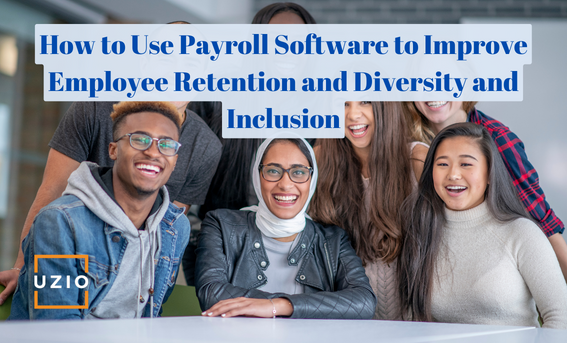
Enhancing Employee Retention through Payroll Software: A Path to Diversity and Inclusion
Quick links
-
Introduction
-
Equitable Compensation: A Pillar of Retention and Inclusion
-
Tailored Benefits: Elevating Job Satisfaction and Inclusiveness
-
Flexible Work Arrangements: Balancing Work and Life for Enhanced Retention
-
Data-Driven Insights: Enhancing Inclusiveness and Retention Strategies
-
Seamless Onboarding and Engagement: A Critical Connection
-
Empowerment through Self-Service: Enhancing Inclusiveness
-
Nurturing a Culture of Recognition and Growth: Impact on Retention
-
Conclusion
1. Introduction
In today’s rapidly changing business landscape, small and medium-sized businesses (SMBs) are increasingly realizing the profound impact of diversity and inclusion on innovation, company culture, and overall success. As a versatile tool that contributes not only to nurturing diversity and inclusion but also significantly enhancing employee retention, modern payroll software has transcended its conventional role. This article delves into how payroll software can be strategically employed to achieve these dual objectives, complemented by real-world examples showcasing its positive influence.
2. Equitable Compensation: A Pillar of Retention and Inclusion
At the core of the employee-employer relationship lies equitable compensation. Payroll software forms the foundation for fair pay practices by standardizing roles and pay scales. This proactive approach not only eliminates pay disparities but also fosters an environment of inclusivity, where every employee’s contribution is valued. By ensuring fair compensation, payroll software becomes integral in building trust and loyalty, significantly impacting employee retention rates.
Example: A technology startup implemented payroll software that eradicated gender-based pay gaps. This initiative not only resulted in a diverse workforce but also increased employee morale and long-term commitment.
3. Tailored Benefits: Elevating Job Satisfaction and Inclusiveness
Acknowledging diverse work styles and personal commitments is integral to creating an inclusive workplace. Payroll software facilitates the provision of flexible work arrangements, such as remote work and adaptable hours. By empowering employees to balance their professional and personal lives effectively, SMBs can enhance job satisfaction, job performance, and ultimately, employee retention.
Example: A retail enterprise leveraged payroll software to implement flexible scheduling, leading to increased employee satisfaction and a higher rate of retention as employees enjoyed improved work-life balance.
4. Flexible Work Arrangements: Balancing Work and Life for Enhanced Retention
Acknowledging diverse work styles and personal commitments is integral to creating an inclusive workplace. Payroll software facilitates the provision of flexible work arrangements, such as remote work and adaptable hours. By empowering employees to balance their professional and personal lives effectively, SMBs can enhance job satisfaction, job performance, and ultimately, employee retention.
Example: A retail enterprise leveraged payroll software to implement flexible scheduling, leading to increased employee satisfaction and a higher rate of retention as employees enjoyed improved work-life balance.
5. Data-Driven Insights: Enhancing Inclusiveness and Retention Strategies
Modern payroll software offers robust data analytics capabilities, providing insights into workforce demographics, turnover rates, and pay equity. By analyzing this data, SMBs can identify areas for improvement within their diversity and inclusion initiatives. Addressing these areas directly impacts employee retention by fostering an environment where all employees feel valued and supported.
Example: A manufacturing SMB used payroll software to analyze workforce data and identified higher turnover rates among specific employee groups. By implementing targeted inclusion strategies, they successfully improved retention among these employees.
6. Seamless Onboarding and Engagement: A Critical Connection
The integration of payroll software with applicant tracking systems streamlines the onboarding process for new hires. This seamless transition sets the stage for an inclusive workplace culture right from the start. A positive onboarding experience directly impacts employee engagement, job satisfaction, and long-term retention.
Example: A hospitality SMB integrated payroll software with its applicant tracking system, resulting in smoother onboarding experiences for new hires. This approach enhanced employee engagement and ultimately contributed to improved retention rates.
7. Empowerment through Self-Service: Enhancing Inclusiveness
Modern payroll software often includes employee self-service portals, allowing individuals to manage their payroll details, access tax forms, and update personal information autonomously. This empowerment fosters a sense of inclusiveness and involvement, further enhancing employee retention.
Example: An e-commerce SMB embraced payroll software’s self-service features, allowing employees to manage their information. This empowerment contributed to increased engagement and played a role in employee retention.
8. Nurturing a Culture of Recognition and Growth: Impact on Retention
Beyond equitable compensation and tailored benefits, fostering a culture of recognition and growth is pivotal for enhancing employee retention. Payroll software can play a role in facilitating this culture by streamlining performance appraisal processes, enabling timely feedback, and identifying opportunities for employee development.
Example: An advertising agency integrated performance appraisal functionalities into their payroll software. This allowed managers to provide real-time feedback, recognize outstanding contributions, and chart out personalized growth paths for each employee. This approach not only boosted employee morale but also significantly improved retention rates as employees felt valued and invested in their career progression.
Recommended Reading: Biggest pain point with Payroll and HR software
Conclusion
Diversity, inclusion, and employee retention have evolved from aspirational goals to essential elements of a thriving SMB’s strategy. By leveraging the capabilities of modern payroll solutions, SMBs can simultaneously advance these objectives. Through fair compensation, tailored benefits, flexible work arrangements, data-driven insights, seamless onboarding, and self-service empowerment, payroll software becomes a potent instrument in creating inclusive workplaces where employees flourish. These practices not only bolster diversity and inclusion initiatives but also directly influence employee retention rates, fostering a loyal and engaged workforce. As businesses continue to evolve, integrating payroll software into diversity and inclusion initiatives remains a strategic imperative for SMBs committed to building diverse, inclusive, and retention-focused workplaces.
Get in touch with us for an expert-led demo to know more about UZIO payroll services.





